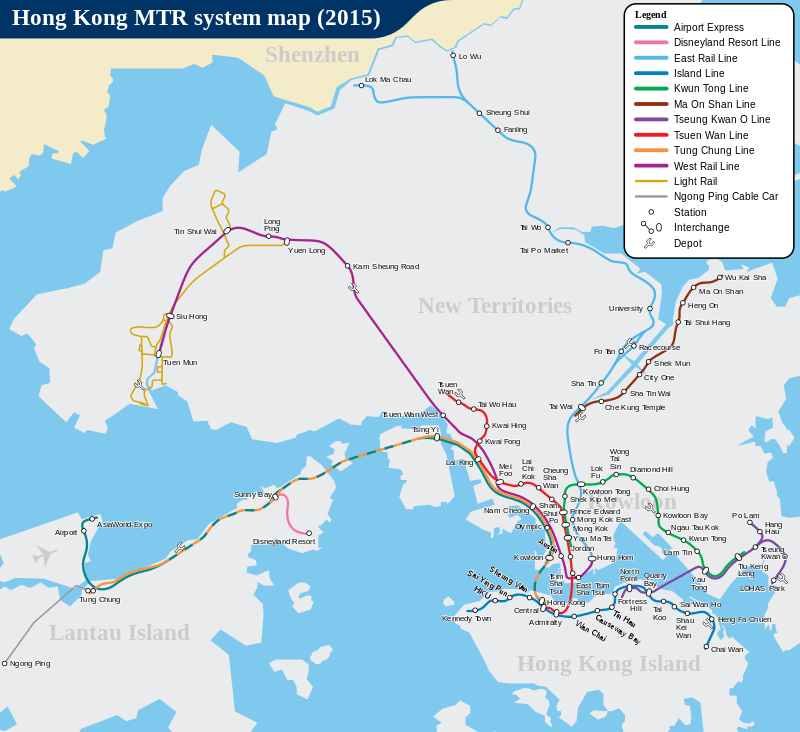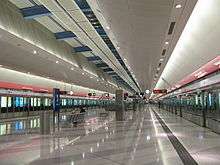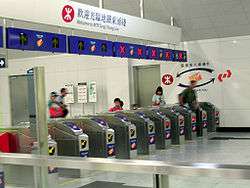MTR Corporation
|
caring for life's journeys | |
|
Public company (SEHK: 0066, OTC: MTRJY) | |
| Industry | Transport, property |
| Founded |
Mass Transit Railway Corporation (1975) MTR Corporation Limited (2000) |
| Headquarters | Kowloon Bay, Kowloon East, Hong Kong |
Area served |
Worldwide Including: Hong Kong Mainland China United Kingdom, London Sweden, Stockholm Australia, Melbourne Australia, Sydney |
Key people |
Frederick Ma Si-hang, Chairman Leong Kwok-kuen, CEO |
| Services | Railways, property developer |
| Revenue |
HK$33.42 billion, |
| Profit |
HK$14.85 billion, |
| Total assets | HK$1.97873 trillion |
| Owner |
Hong Kong Government (The Financial Secretary Incorporated) 76% |
Number of employees | 21,256 (2012, Global) |
| Website | www.mtr.com.hk |
|
Footnotes / references Data and info sorce: -《MTRC Press Release》、 All data last updated at 31/12/12 | |
MTR Corporation Limited (Chinese: 香港鐵路有限公司; literally: "Hong Kong Railway Corporation Limited") is a company listed on the Hong Kong Exchange and Hang Seng Index. MTR runs Hong Kong's Mass Transit Railway (MTR), and is also a major property developer and landlord in Hong Kong. It also invests in railways in different parts in the world, and has obtained contracts to operate rapid transit systems in London, Stockholm, Beijing, Shenzhen, Hangzhou, Melbourne, and Sydney.
History of the Corporation
The Mass Transit Railway Corporation (Chinese: 地下鐵路公司) was established in 1975 as a government-owned statutory corporation to build and operate a mass transit railway system to meet Hong Kong's public transport needs. On 30 June 2000 the MTRC was succeeded by the MTR Corporation Limited (MTRCL, Chinese: 地鐵有限公司). As with the MTRC, the MTRCL's principal business is to operate the mass transit railway system. Following a successful initial public offering, the MTRCL was listed on the Hong Kong Stock Exchange on 5 October 2000, however the government is still the major stakeholder in the MTRCL.
On 2 December 2007, the company started running the original KCR railway system under a concession agreement with the Hong Kong Government in what was known as the MTRCL-KCRC merger. The Chinese name of the company became 香港鐵路有限公司 (literally translated as Hong Kong Railway Corporation Limited) but the English equivalent remained MTR Corporation. The logo of MTR symbolises a railway line connecting Hong Kong Island and Kowloon.
Privatisation
On 5 October 2000, the MTR Corporation Limited became Hong Kong's first privatised rail and metro company, which marked the start of the Hong Kong government's planned initiative to wind down its interests in various public utilities. Prior to its listing on the Hong Kong Stock Exchange, the Mass Transit Railway Corporation was wholly owned by the Hong Kong Government. The offering involved the sale of around one billion shares, and the company now has around 250,000 shareholders. In June 2001, MTR was transferred to Hang Seng Index.
At the time of the initial public offering, the company was operating with a budget surplus of HK$360 million ($46.1 million), which had increased from a surplus of HK$278 million ($35.6 million) in 1997. However, after the IPO profits decreased as the company lost much of its subsidies (mainly development rights of lands) from the government, dropping to HK$139 million. Yet, this trend seems to have reversed, as profits grew more than tenfold in the fourth quarter of 2004, making it one of the few profitable public transport systems in the world.
MTR Corporation has always been reliant on developing properties next to railway stations for its profits (although the rail lines are profitable themselves); many recently built stations are incorporated into large housing estates or shopping complexes. Examples of this type of construction can be seen at Tsing Yi station, which is built next to the Maritime Square shopping centre, and directly underneath the Tierra Verde housing estate.
Operations by market
Hong Kong
The MTR Corporation Limited is responsible for the operation of MTR (and KCR since 2 December 2007) in Hong Kong. Besides railway operations, the MTRCL is also actively involved in the development of key residential and commercial projects above existing stations and along new line extensions as well as many other commercial activities associated with the railway. The most recent of such developments was the large PopCorn shopping centre development which was built in conjunction with Tseung Kwan O station. The MTRCL is also involved in the letting of retail and poster advertising space, ATM banking facilities, and personal telecommunication services. It also provides consultancy services to organisations worldwide.
Rail services
Mass Transit Railway (MTR) is the rapid transit railway system in Hong Kong. Originally opened in 1979, the system now includes 220.9 km of rail with 155 stations, including 87 railway stations and 68 light rail stops.
-

Map
-

Station
-

An Airport Express Train
MTR-KCR merger


There had been some discussion of merging the Kowloon–Canton Railway Corporation (KCRC), which was also government-owned, and the MTR to make the territory's transport system more efficient. The MTRCL backed such a merge while the KCRC opposed the plan. In March 2004, the Hong Kong Government officially encouraged the two companies to merge.
On 11 April 2006, the Hong Kong Government officially announced the details of the proposed merger. Under the non-binding Memorandum of Understanding the Government has signed with KCRC, KCRC would grant a Service Concession to the MTRCL to operate the KCR system, with an initial period of 50 years. The KCRC would receive a one-time upfront payment of HK$4.25 billion, a fixed annual payment of HK$750 million and a variable annual payment based on revenues generated from operation of the KCR system. In addition, MTRCL would make a payment of $7.79 billion for the acquisition of property and other related commercial interests.[1]
The railway lines the KCRC operated were less profitable than the MTRC, and the KCRC was less active in property development. It was widely considered that the Government's choice was to avoid being criticised for selling assets of the KCRC, which it wholly owned to MTRCL at an underpriced level. Leasing the operation right of the KCR system to the MTRCL could avoid actually selling the KCRC.
On 2 December 2007, the Chinese name of the MTRCL was changed to 香港鐵路有限公司[2] (literal translation: Hong Kong Railway Corporation Limited) after being granted the Service Concession while the English name will remain unchanged.[3][4] The KCRC is now a holding company of the KCR system, without actual railway operations. The merger was approved by shareholders of the MTRCL on 9 October 2007. The merger is effective for 50 years.
Fare reductions
All adult Octopus Card holders would be the first to benefit from the merger.[5] Student and Concessionary Octopus holders would also benefit from the merger by further reducing $0.1 from their 50% off fares.[5] Student Octopus holders would continue to pay the current reduced concessionary fares on the MTR network. Elderly Octopus holders would be introduced to a new fare system which only the elderly can enjoy a $2 fare to anywhere on the MTR network (excluding Airport Express, Light Rail, and Cross-Boundary Stations).[6]
Future expansions
The following railway links are being constructed by MTR currently:
- South Island Line (East and West) (Two lines to the south of Island Line, to South Horizons residential area and Wong Chuk Hang; under planning, South Island Line (East) to be completed in late 2016)
- Kwun Tong Line Extension (to Ho Man Tin and Whampoa; under planning, to be completed in 2016)
- Sha Tin to Central Link (extension of Ma On Shan Line to Tsim Sha Tsui, Kwun Tong Line extension to Whampoa, and East Rail Line to Admiralty; under planning;)
The following railway links are planned by MTR, and currently under the consultation from the HKSAR government:
- South Island Line West; under planning
- Northern Link (New Territories) (Line from Kam Sheung Road to Chau Tau and Lok Ma Chau; under planning)
- North Island Line (absorption of Island Line by the Tung Chung and Tseung Kwan O lines; under planning)
Property management
Property is one of the main businesses of the MTR with the profits from this arm outstripping those from fares. In 2009 of a net profit of HK$7.3 billion, MTR made HK$3.55 billion from property and HK$2.12 billion from transport operations.[7] The MTR tries to develop suitable sites related to their new railway projects and their existing railway. For instance, the reclaimed land situated in West Kowloon that is owned by the MTR will be developed into an area with residential, office and retail space. Two of Hong Kong's largest banks, HSBC and the Bank of China are to have office towers there. Furthermore, will be more than 7,000 housing units in the development. The MTR also owns several shopping centres, as well as the new International Finance Centre.
Shopping centres
The MTR Corporation invested heavily to develop large-scale shopping centres around MTR stations. The most recent example is the Popcorn located at Tseung Kwan O station. It is a mall connecting the adjacent malls, and act as the platform of the high-end housing and hotels. The other example of such a shopping centre is Maritime Square (青衣城) located at Tsing Yi station. Maritime Square is a nautical-themed mall in which there are supermarkets, boutiques, bookstores, a cinema, and restaurants. Since Tsing Yi station serves as the transportation hub for Tsing Yi, Maritime Square is also easily accessible by other transportation means including buses and taxis. Other shopping centres developed and managed by the corporation include ELEMENTS, Paradise Mall, Telford Plaza, Luk Yeung Galleria and The Lane.
United Kingdom
In 2004, MTR in a joint venture with Sea Containers unsuccessfully bid for the South Eastern rail franchise. In 2007, MTR was shortlisted to bid for the West Midlands franchise, but did not lodge a bid.
MTR and Laing Rail established a 50/50 joint venture (MTR Laing) to bid for the London Overground concession. In June 2007, MTR Laing trading as London Overground Rail Operations were awarded concession. It is mainly managed by Laing Rail Group Management moved from its Chiltern Railways division with MTR providing specialists as needed.
In February 2009, MTR Corporation were shortlisted to operate the Tyne and Wear Metro service in Newcastle upon Tyne,[8] and in November 2013 were announced as a bidder for the ScotRail franchise.[9]
In May 2015, MTR Crossrail commenced an eight-year contract to operate the Crossrail concession, with an option for a further two years.[10] In June 2015, MTR was shortlisted to bid for the next London Overground concession in its own right.[11][12]
Sweden
On 20 January 2009, it was announced that MTR was awarded the contract to operate the Stockholm Metro. The contract is for eight years with an option to extend the agreement for another six years. MTR started operating the metro on 2 November 2009.[13]
MTR has in March 2015 started fast long distance traffic between Stockholm and Gothenburg with own ticket sales using the brand name MTR Express.[14] They have bought six electric multiple units of type Stadler Flirt.
Australia
In July 2008 there were reports that they are bidding to have the right to operate Melbourne's extensive metropolitan train network, aligned with United Group.[15] In August 2008 it was confirmed that they had been shortlisted.[16]
On 25 June 2009 MTR were awarded the rights to operate Melbourne's train network as part of a joint venture with John Holland Melbourne Rail Franchise and United Group Rail Services.[17] The contract began on 30 November 2009 and it will continue for 8 years, with the option of extending that contract for another 7 years.[17] It is set to operate as a locally themed consortium MTM (Metro Trains Melbourne). MTR took over from Melbourne's existing network operator (French-owned firm Connex) on 30 November 2009.[17][18]
On 24 June 2014, Northwest Rapid Transit consortium, a consortium consisting of MTR, John Holland Group, Leighton Contractors, Plenary Group and UGL Rail, was selected as the preferred operator to deliver the North West Rail Link operations contract.[19] The North West Rail Link is expected to open in 2019 or 2020.
Mainland China
|
 | |
| Public company | |
| Industry | Transport, property |
| Founded |
Beijing (16 January 2006) Shenzhen (1 July 2010) Hangzhou (6 September 2012) |
| Headquarters | (Beijing, Shenzhen, & Hangzhou), China |
Area served | Beijing, Shenzhen, Hangzhou |
| Website |
Beijing MTR Corporation MTR Corporation (Shenzhen) Hangzhou MTR Corporation |
- Beijing MTR
The company has also formed a joint-venture Beijing MTR Corporation Limited (49%). with Beijing Capital Group ("BCG") (49%), and the Beijing Infrastructure Investment Co (2%). ("BIIC") to build and operate for 30 years Line 4 of Beijing Subway, Daxing Line, Line 14 of Beijing Subway, and has also signed an agreement to build and operate Line 16 of Beijing Subway[20]
- MTR (Shenzhen)
The company concluded initials concession agreement to build phase 2 of the Line 4 of Shenzhen Metro, and to operate the whole line on a BOT basis for 30 years. The phase 2 of Line 4 have been in operation for passengers since 16 June 2011.
- Hangzhou MTR
The company formed a new joint-venture Hangzhou MTR with Hangzhou Metro Group in 2012 to operate Line 1 of Hangzhou Metro for 28 years, in which MTR holds 49% of the stock.
See also
References
- ↑ "Press Release: Government has reached understanding with MTRCL on the terms for merging the MTR and KCR systems". Hong Kong SAR Government. 11 April 2006. Retrieved 17 November 2007.
- ↑ "Rail Merger Bill" (PDF). Legislation Council of the Hong Kong SAR. Retrieved 8 November 2007.
- ↑ "Appointments announced for post-merger MTR Corporation Limited" (Press release). Hong Kong Government. 8 August 2007. Retrieved 10 November 2007. (Comparing with the Chinese version)
- ↑ "Rail Merger Bill to be introduced into Legco (English name remain MTR)" (Press release). Hong Kong Government. 8 June 2006. Retrieved 15 November 2007. (Comparing with the Chinese version)
- 1 2 Railway Merger Proposal in Hong Kong Gets Green Light, Hong Kong Economic and Trade Office in United States.
- ↑ Elders ride on the MTR on Sundays and public holidays for just $2 for the whole journey.
- ↑ Ng, Jeffery (9 March 2010). "MTR Posts 16% Rise in Profit, Plans to Offer 5,000 Apartments". The Wall Street Journal.
- ↑ "Foreign bids for Metro contract". BBC News. 2 February 2009. Retrieved 3 February 2009.
- ↑ "ScotRail franchise shortlist named". BBC News. 1 November 2013. Retrieved 3 February 2009.
- ↑ "MTR selected to operate Crossrail services". Railway Gazette International. 18 July 2014.
- ↑ Four bidders shortlisted for London Overground operating concesssion Railway Gazette 29 June 2015
- ↑ TfL announces Overground Shortlist Railnews 30 June 2015
- ↑ "Hongkong-bolag vann t-banekontrakt värt 36 miljarder (Swedish)". E24.se. 20 January 2009.
- ↑ http://www.mtrexpress.se/
- ↑ Lucas, Clay (28 August 2008). "Global flavour to bidders for train, tram contracts". The Age (Melbourne, Australia). Retrieved 4 July 2008.
- ↑ "SHORTLIST TO RUN MELBOURNE'S TRAINS ANNOUNCED". Media Release: Premier of Victoria. www.premier.vic.gov.au. 28 August 2008. Retrieved 8 October 2008.
- 1 2 3 Cooper, Mex (25 June 2009). "New train, tram operators for Melbourne". The Age (Australia). Retrieved 25 June 2009.
- ↑ Swinburne Institute for Social Research: Putting the Public Interest back into Public Transport.
- ↑ Major milestones reached on North West Rail Link as preferred operator selected, Transport for New South Wales, Retrieved 24 June 2014
- ↑ website of Beijing MTR Corporation Limited.
External links
- MTR Customer Website (English)
- Press release on Wuhan (Adobe Systems Acrobat PDF format)
- History and Development of the Company, EDGAR Online.
- Transport for London press release
- MTR Properties and MTR Property Management
- Maritime Square Website
- Paradise Mall Website
- Luk Yeung Galleria Website
- Telford Plaza Website
- Residents Portal
- Documentaries
- MTR Underground Iron – The Building of a Railway (1/5)
- MTR Underground Iron – The Building of a Railway (2/5)
- MTR Underground Iron – The Building of a Railway (3/5)
- MTR Underground Iron – The Building of a Railway (4/5)
- MTR Underground Iron – The Building of a Railway (5/5)
| ||||||||||||||||||||||||||||||||||||||||||||||
| ||||||||||||||||||||||||||||||
|

_logo.png)